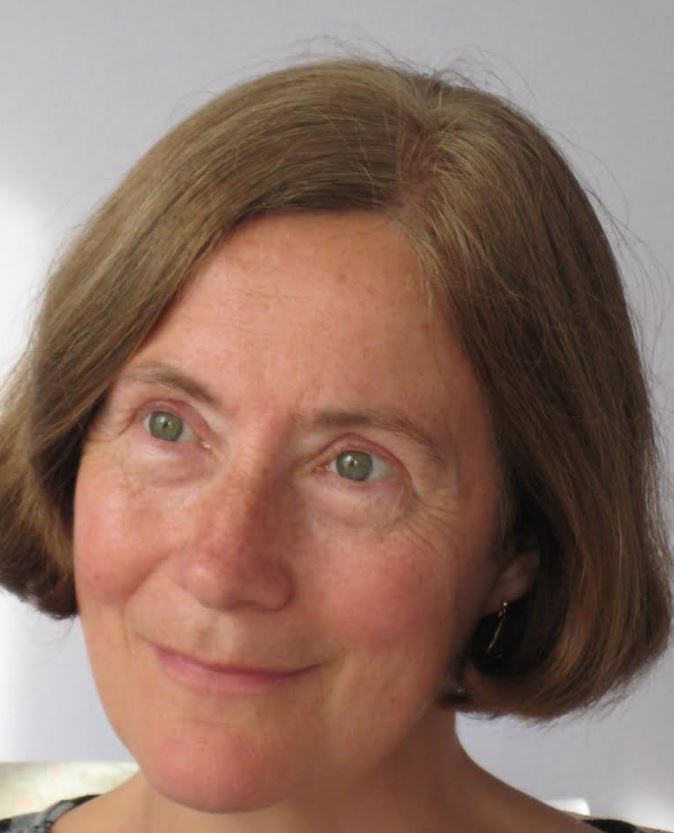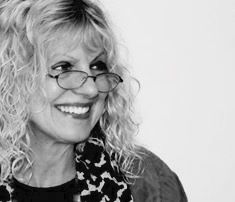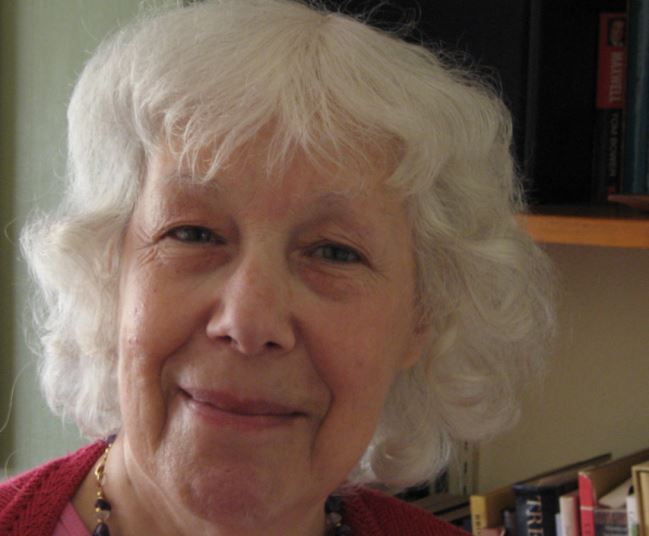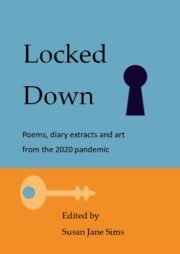Poetry Space Competition 2019 – RESULTS
First of all a sincere thank you to every poet who entered Poetry Space Competition 2019.
Our judge for our 10th anniverasry poetry competition 2019 was Caroline Price

Caroline Price is a violinist, teacher and prize-winning poet living in Suffolk. She has published four collections, most recently Picnic on the rocks, with frog (Shoestring Press 2017) and is co-editor, with Myra Schneider, of an anthology of women’s poetry, Four Caves of the Heart (Second Light 2004). She has also published short fiction and in 2015 was runner-up for the Society of Authors’ Tom-Gallon award for a short story. She has worked as writer-in-residence in secondary schools in France and is an occasional tutor for the Poetry School.
The top three winning poems
Where bluebells are thickest
I lie down, look past worms of catkins
to a sky buoyant enough to persuade me
I’m floating on a salty sea and can never drown.
Thin drifts of cloud remind me of friends I’ve lost
this winter, the way each year bowls out another couple,
wickets toppling after too few sixes.
When I walk to the road again, my head’s leaking
birdsong. Cars are stalled behind a huge white horse,
summoned from the sun for some heavenly chariot.
The flanks are brushed to a gleam, the mane combed
as if every hair of its head were numbered.
The girl steering it has tiny wrists and fat-free thighs,
and she bobs like a cork, barely a teenager. If only,
I think, the soul could ride the body like this.
If only I were half mortal, half horse
of the apocalypse, able to stop men in their tracks
as she does, stop the whole world in its foolish tracks,
ride into an afternoon torn wide open.
Rosie Jackson – 1st Prize £500
‘I’m so shocked and delighted to discover I’ve won the Poetry Space competition. The poem was one of those that came easily, was simple and heartfelt, written after a walk I do often in my local woods. When I entered the comp, I worried it wasn’t sophisticated enough. But reading it again now, I see that it’s precisely the simplicity and depth of feeling that make it work. Utterly thrilled. Thank you Caroline and Sue!’ Rosie Jackson

Based near Frome, Somerset, Rosie Jackson offers workshops in poetry and memoir writing in the UK and world-wide, as well as individual mentoring.
Rosie is widely published. Her books include The Glass Mother: A Memoir, The Light Box (Poetry), Mothers Who Leave, Fantasy: The Literature of Subversion and What the Ground Holds.
She has won many awards including 1st prize at Wells Poetry Festival 2018, and 1st prize in the Stanley Spencer Competition, Cookham 2017. Rosie collaborates with film maker Gordon McKerrow on poetry films.
Keeping Busy
September and they’re ready
nipple-soft and swollen,
heavy with a yeasty sweetness.
Corn-stubble crunches under her shoes,
scratches her ankles,
air I dry as toast, humming with heat.
She works the field, bluebottles
bright as scarab beetles
crawl over bloated berries, stumble away.
Thorns pull at her clothes as she forces her way
through bramble thickets,
nettle stings tingle her bare legs – she hardly notices.
Arms stained with juice, sticky and sun-weary,
she idles up the lane –
a trail, red as blood, dripping from bulging plastic bags.
She’ll make jam, give it to the hospital for the staff,
no need to keep any,
ask them if they could use baby-grows, new born size.
Jenna Plewes – 2nd Prize £250
That’s great news, Sue. I am delighted. Jenna Plewes
Jenna Plewes’ poems have been published in magazines in the UK and Canada and in several anthologies. Her first full collection Salt was published by IDP in 2013. Gifts, a collection of contemplative poetry published in 2014 is available on Amazon. Pull of the Earth is her second full collection with IDP. Against the Pull of Time is published by V.Press, 2018 She was highly commended in the Hastings International competition in 2012, highly commended in the Geoff Stevens memorial prize in 2013 and 2014, commended in the Four Corners International poetry competition and in the Second Light Poetry Competition in 2015 and 2017. In 2016 she was shortlisted in Poetry on the Lake, and Poetry Space competitions. She won 1st prize in the Settles Sessions Competition in 2017 and 3rd prize in the Barnet Poetry competition in 2018.
The Horse-Washing
Though what I remember is tail after chalky
white tail hanging over sheer
grey rock and, as they become rivers,
wanting to leap from the train to gape
at waters spitting and gasping their way
through the valley.
Norway vanishes
when I come upon two men and a horse
at the pause in a Hokusai waterfall.
And I can’t take my eyes off the scene:
those taut white runlets edged with blue,
their unstoppable descent, the horse
with his head to one side, expression
quizzical, as if he is overseeing
the half-naked men while they scrub,
scrub his back and flank.
Nearby the fall
splits again and jams giant fork tines
into the stream below. Nothing is at rest:
sweat is pouring from the labourers’ bodies,
the bossy animal keeps swivelling
his neck, spray is scattering dots
over black jags of rock, creating
a night sky that trembles with stars –
even the bushes are thrusting roots
into the mountain’s steep sides,
and the omnipotent waters are roaring
in triumph: movement is everything.
Myra Schneider

Myra Schneider’s first poetry collection was published in 1984 by John Killick who had just started the Littlewood Press in Yorkshire. Since then she has published nine collection of poetry, the latest being Lifting the Sky (Ward Wood Publishing). Since the late 1980s Myra has tutored poetry courses and groups and run or co-run one-off workshops all over the country and in Ireland and Normandy. She has also tutored for The Poetry School. She was shortlisted for a Forward prize in 2007. Her work has appeared in a large number of anthologies and been broadcast on BBC Radio 4 in Poetry Please. She is currently a consultant to the Second Light Network of women poets founded Dilys Wood in the late 1990s. She also writes reviews and articles for their twice-yearly magazine for women poets, ARTEMIS poetry and occasionally for other magazines.
I rarely enter poetry competitions but I wanted to support The Poetry Space which does much to encourage poets and poetry and especially this year which is a special anniversary. I was surprised and delighted to win a prize. Earlier this year I became excited by the idea of energy, its importance in life and it’s importance in writing so I began to explore the idea in very different ways. The Horse-Washing is one of them. Myra Schneider
Full results list
All poets on this list will receive their choice of a book from the Poetry Space shop as well as a complimentary copy of the prizewinners’ anthology when it is published.
1st Prize:
Where bluebells are thickest Rosie Jackson
2nd Prize:
Keeping Busy Jenna Plewes
3rd Prize:
The Horse-washing Myra Schneider
Highly Commended:
Rubato Beliz Mackenzie
broken haiku Lizzie Ballagher
He Gave Me Gladioli Isobel Shirlaw
The night of the peacocks L.A. Watts
Commended:
Iktsuarpok Eleni Cay
In the Presence of a Hawk Ian Royce Chamberlain
Oak Tree Years Deborah Harvey
The Bone Diviner Sue Davies
Song Scott Elder
A stitch in time Julie Burke
Treading Lightly Claudia Court
Tea with Henry Diane Jackman
Joints Julia D. McGuinness
Last Appointment at the Vet Louise Wilford
Our hoedown had ended Robin Muers
Normally we would have 17 runners up however two poets withdrew their entries after the judging which is disappointing as we could have awarded prizes for two more poems.
Judge’s Report
It’s always an exciting moment, as a judge, when you open that box of poems for the first time and start reading, knowing you’re about to be entertained by a wealth of subjects and taken into who knows how many different worlds. And this year’s Competition didn’t disappoint. An entry of over 200 poems reflected a whole range of preoccupations, from concerns about political, social and environmental issues through poems inspired by art, literature and individual people to very personal responses to experiences of grief, bereavement, illness and ageing. The voices ranged from formal and literary to thoroughly contemporary; there was philosophy, satire and humour; there were examples of most poetic forms as well as plenty of poems written in free or experimental verse. Each entry without fail demonstrated a desire to engage the reader and convey human emotions.
My task was to select twenty poems. So what was I was looking for, when I started to separate from the pile those poems that might be part of the final twenty?
I was looking for a voice which stayed consistent and convincingly matched its subject. Also, evidence of craft: how to present the material in the most effective way. And ideally, an ending that opened the poem out, that took me somewhere unexpected. I wanted to feel compelled to reread the poem – perhaps in a new light – and ultimately I wanted the sense that I was experiencing the writer’s experience as if it were my own.
I looked for light and air in a poem; despite the great care that had obviously been taken in many cases to find interesting words and descriptions, the result was sometimes so dense and richly ‘poetic’ that it overwhelmed the subject and pushed the reader away. I often wanted to say: beware cliché, the over-familiar image… A good poem has to surprise; and specific concrete details are so much more effective and convincing than generalisations, which the reader tends to gloss over. Rhyme and form very much have a place in contemporary poetry, and I enjoyed reading the many formal poems – but less so when the constraints of the form had been allowed to distort the syntax. As a final point, many poems had distracting typographical errors; a quick proof-read before submitting is always worthwhile.
I read and read again. It wasn’t too hard to whittle my pile of possibles down to forty but then it became more difficult. Some poems which had struck me strongly at an earlier stage were put aside now because they didn’t hang together quite coherently enough… I had to favour poems which worked as a whole experience even if they contained flaws.
And ultimately my choices had to be subjective: what spoke to me. I’ve selected poems that lingered in my mind – because of their subject, or through particularly haunting images, or a perfect ending… There is something about all these poems that held my attention and made me want to reread them for the pleasure of taking in that phrase, that image, that idea… A little magic happens for me in all these poems.
From my twenty, a handful kept rising ‘to the top’, and I knew that these would contain the prize-winners. Eventually I knew that there were seven that I wanted at least to highly commend – but only three could win a prize. And although I’d imagined that this final stage would be the most challenging, in fact I found that my three prize-winners were clear to me and had been for some time.
3rd prize: THE HORSE-WASHING
This poem has a striking title and an arresting opening image: the ‘chalky white tails’ of water, so satisfyingly reinforced by the real horse later. The opening grammatical device (“Though what I remember is…”) hooks the reader straight away and compels us to read on. The images and thoughts seem to evolve as we read – we are ‘there’, looking through the writer’s eyes. This is an extraordinarily immediate poem: we can see, feel and hear the landscape and scene. The writing – the choice of language and line breaks – is very assured and the energy beautifully sustained, culminating in an ending which feels at the same time surprising and absolutely right.
2nd prize: KEEPING BUSY
To start with, this poem doesn’t jostle for attention, with its gentle pace and familiar pastoral scenes. But when we reach the end and realise what the poem is about, the clear, unfussy language seems absolutely justified: it serves to underline the emotion that is being suppressed. The tone is perfectly pitched – objective yet full of latent feeling and energy – and perfectly sustained. The images have been carefully chosen throughout to chime with the subject, and allow us to recognise how the ‘she’ of the poem, despite her efforts to distract herself, is unable to avoid seeing her personal tragedy reflected in everything around her. The last line makes sense of the title – and immediately we are drawn to re-reading, in a different light.
1st: WHERE BLUEBELLS ARE THICKEST
I love the easy, unforced opening of this poem: we’re taken straight into the heart of the experience; it is immediately physical and real. We read the ‘I’ of the poem as ourselves right from the start: it is we who are lying among bluebells, looking up through catkins at the sky above. Each thought follows on naturally from the last, and is pin-pointed by an interesting image or metaphor. The writing is succinct; short sentences move the poem on, with only the important things being said. The balance of concrete physical details and philosophical musings feels absolutely right. The vision of the huge horse blocking the traffic, and its young rider, is memorable. And the way in which the writer reacts is unexpected and original: their wish – which could so easily be our wish – is stated simply and without fuss and is all the more poignant for it. Throughout, the language and phrasing are perfectly judged and innately musical. This is a poem which is satisfying on all levels and really does live on in the mind.







